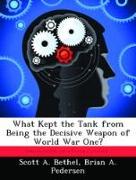What Kept the Tank from Being the Decisive Weapon of World War One?
BücherAngebote / Angebote:
The modern tank was invented in 1916 as a means to mechanically overcome the stalemate of trench warfare brought on by the increased lethality of fires employed during World War I. Its introduction received mixed reviews among British leaders. Some advocated its continued role supporting infantry and artillery attacks. Others envisioned it as a revolutionary weapon with the potential to effect decisive results at an operational and strategic level. Still others viewed it as a useless and unnecessary drain on already-scarce resources of men and materiel. Ultimately, the tank was an ancillary sideshow and failed to produce a decisive knock-out punch leading to Allied victory in World War I. The purpose of this paper is to examine the reasons why the tank failed to become the decisive weapon of World War I. It specifically focuses on the genesis of logistics, maintenance, training, and production infrastructure, studying the interaction of development, employment, acceptance or lack thereof, and subsequent frictions which negatively influenced the ascent of tanks as the decisive weapon of World War I. By examining the British efforts to design support systems while simultaneously producing, fielding and employing multiple iterations of the tank, this paper seeks to promote a deeper understanding of the potential challenges facing other armed forces that are rapidly upgrading or replacing combat systems in the midst of the Global War on Terror.
Folgt in ca. 15 Arbeitstagen

